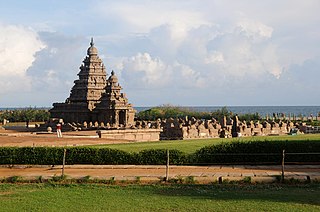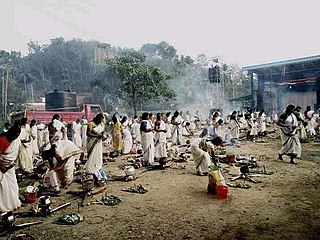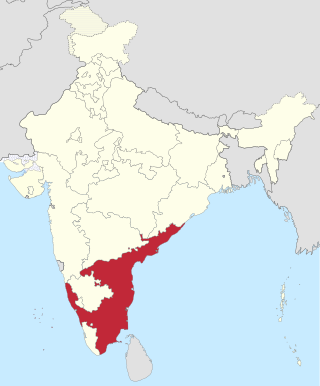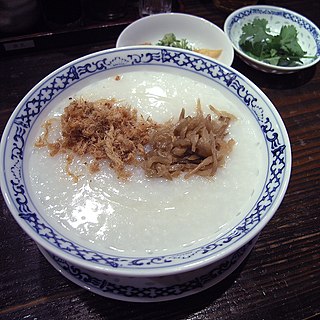
Tamil Nadu is the southernmost state of India. The tenth largest Indian state by area and the sixth largest by population, Tamil Nadu is the home of the Tamil people, who speak the Tamil language—the state's official language and one of the longest surviving classical languages of the world. The capital and largest city is Chennai.

The Coromandel Coast is the southeastern coastal region of the Indian subcontinent, bounded by the Utkal Plains to the north, the Bay of Bengal to the east, the Kaveri delta to the south, and the Eastern Ghats to the west, extending over an area of about 22,800 square kilometres. The coast has an average elevation of 80 metres and is backed by the Eastern Ghats, a chain of low lying and flat-topped hills.

Upma, uppumavu, or uppittu is a dish of thick porridge from dry-roasted semolina or coarse rice flour. Upma originated from South India, and is most common in Kerala, Andhra Pradesh, Tamil Nadu, Odisha, Telangana, Karnataka, Maharashtra, and in Sri Lankan Tamil communities. Often, depending on preference, it has various seasonings and/or vegetables added during cooking.

Kongu Nadu, also known as Kongu Mandalam, is the geographical region comprising the western and north-western part of the Indian state of Tamil Nadu and in some instances, parts of southeastern Karnataka and eastern Kerala. The region covers an area of roughly 60,895 km2 (23,512 sq mi) with a population of over 27.4 million.

Pandya Nadu or Pandi Nadu is a geographical region comprising the southern part of the present day state of Tamil Nadu. The region is bounded on its West by the Venad/Ay Nadu, Northeast by the Chola Nadu and Northwest by the Kongu Nadu. It comprises the present-day districts of Madurai, Theni, Sivaganga, Ramanathapuram, Virudhunagar, Tirunelveli, Tenkasi, Thoothukudi, Kanniyakumari, parts of Pudukkottai and Dindigul.

Chola Nadu is an ancient region spanning on the current state of Tamil Nadu and union territory of Puducherry in southern India. It encompasses the lower reaches of the Kaveri River and its delta, and formed the cultural homeland and political base of the Chola Dynasty which ruled large parts of India and Sri Lanka between the 9th and 13th centuries CE. Uraiyur served as the early Chola capital, then medieval Cholas shifted to Thanjavur and later cholas king Rajendra Chola I moved the capital to Gangaikonda Cholapuram in Ariyalur district in the 11th century CE. Chola Nadu is therefore larger than the Tanjore region or the Cauvery delta in the strict sense. Although it essentially corresponds to these two overlapping areas.

Curd rice, also called yogurt rice, is a dish originating from India. The word "curd" in Indian English refers to unsweetened plain yogurt. It is most popular in the South Indian states of Tamil Nadu, Kerala, Karnataka, Telangana and Andhra Pradesh; and also in West Indian states of Rajasthan, Gujarat and Maharashtra.

The Tamil diaspora refers to descendants of the Tamil speaking immigrants who emigrated from their native lands in the southern Indian subcontinent to other parts of the world. They are found primarily in Malaysia, Arab states of the Persian Gulf, South Africa, North America, Western Europe, and Singapore. It can be divided into two main diasporic clusters, due to geographical, historical and cultural reasons, as Indian Tamil diaspora and Sri Lankan Tamil diaspora.

Coimbatore district is one of the 38 districts in the state of Tamil Nadu in India. Coimbatore is the administrative headquarters of the district. It is one of the most industrialized districts and a major textile, industrial, commercial, educational, information technology, healthcare and manufacturing hub of Tamil Nadu. The region is bounded by Tiruppur district in the east, Nilgiris district in the north, Erode district in the northeast, Palakkad district, Idukki district and small parts of Thrissur district and Ernakulam district of neighboring state of Kerala in the west and south respectively. As of 2011, Coimbatore district had a population of 3,458,045 with a sex ratio of 1,000 and literacy rate of 84%.

Tamilakam was the geographical region inhabited by the ancient Tamil people, covering the southernmost region of the Indian subcontinent. Tamilakam covered today's Tamil Nadu, Kerala, Puducherry, Lakshadweep and southern parts of Andhra Pradesh and Karnataka. Traditional accounts and the Tolkāppiyam referred to these territories as a single cultural area, where Tamil was the natural language and permeated the culture of all its inhabitants. The ancient Tamil country was divided into kingdoms. The best known among them were the Cheras, Cholas, Pandyans and Pallavas. During the Sangam period, Tamil culture began to spread outside Tamilakam. Ancient Tamil settlements were also established in Sri Lanka and the Maldives (Giravarus), prior to the migration of Prakrit speakers.

The region of Tamil Nadu in the southeast of modern India, shows evidence of having had continuous human habitation from 15,000 BCE to 10,000 BCE. Throughout its history, spanning the early Upper Paleolithic age to modern times, this region has coexisted with various external cultures.

Koozh is the Tamil name for a porridge made from millet. It is a traditional food in villages of Tamil Nadu.

Tamil South Africans are Indian South Africans of Tamil descent. Tamil people form the majority of Indian immigrants who came from India to Natal, South Africa, from 1860 onwards. After the expiry of their indentures most of these Indians moved to the cities, becoming established as a thoroughly urban population.

Pongala is a harvest festival of Kerala and Tamil Nadu. The name 'Pongala' means 'to boil over' and refers to the ritualistic offering of porridge made of rice, sweet brown molasses, coconut gratings, nuts and raisins. Generally women devotees participate in this ritual. Tamil people celebrate as Pongal.

Madras State was a state of India which was in existence during the mid-20th century. The state came into existence on 26 January 1950 when the Constitution of India was adopted and included the present-day Tamil Nadu, Kerala and parts of neighbouring states of Andhra Pradesh and Karnataka. Andhra state was separated in 1953 and the state was further re-organized when states were redrawn linguistically in 1956. On 14 January 1969, the state was renamed as Tamil Nadu.
Coimbatore is the second largest city in the Indian state of Tamil Nadu. It is a major commercial centre and an industrial hub of Tamil Nadu and is known as the Manchester of South India.

Congee is a form of savoury rice porridge made by boiling rice in a large amount of water until the rice softens. Depending on rice–water ratio, the thickness of congee varies from a Western oatmeal porridge to a gruel. Since the history of rice cultivation in Asia stretches back to the Baiyue-inhabited lower Yangtze circa 10,000 BC, congee is unlikely to have appeared before that date. Congee is typically served with side dishes, or it can be topped with meat, fish, and pickled vegetables.

The South Indian diaspora comprises people who have emigrated from South Indian states to other Indian states and other countries, and people of South Indian descent born or residing in other Indian states and other countries.

The Tamil Nadu diaspora comprises people who have emigrated from South Indian state of Tamil Nadu, to other non-Tamil Indian states and other countries, and people of Tamil Nadu descent born or residing in other non-Tamil Indian states and other countries.















